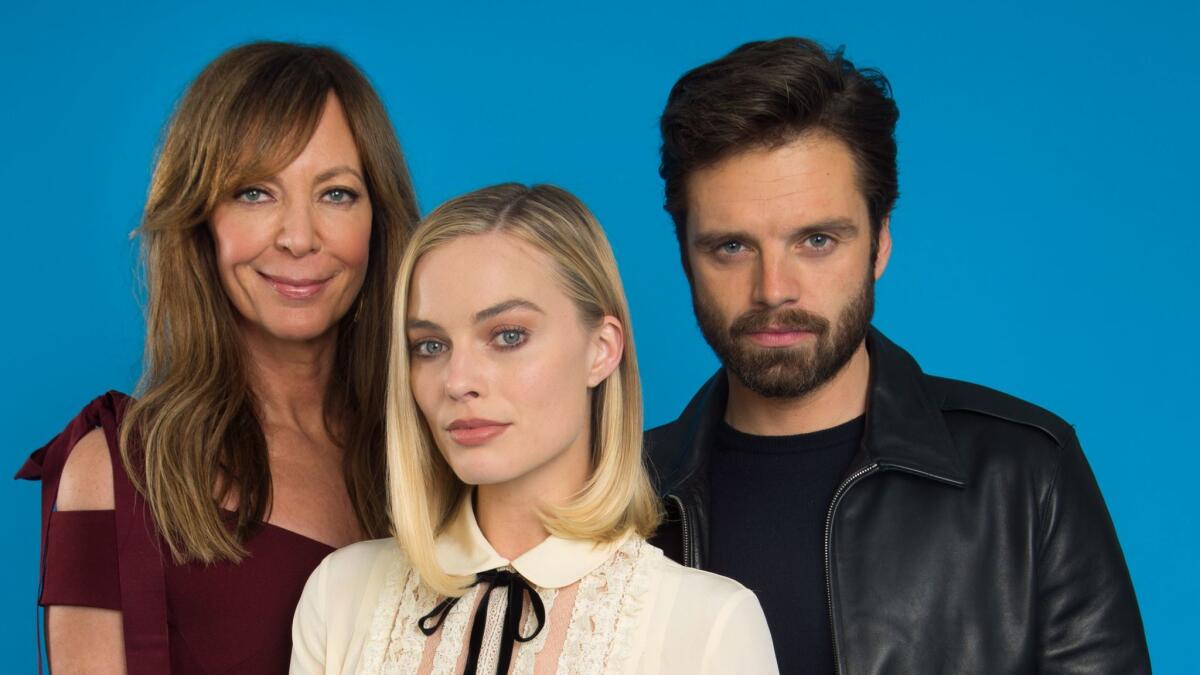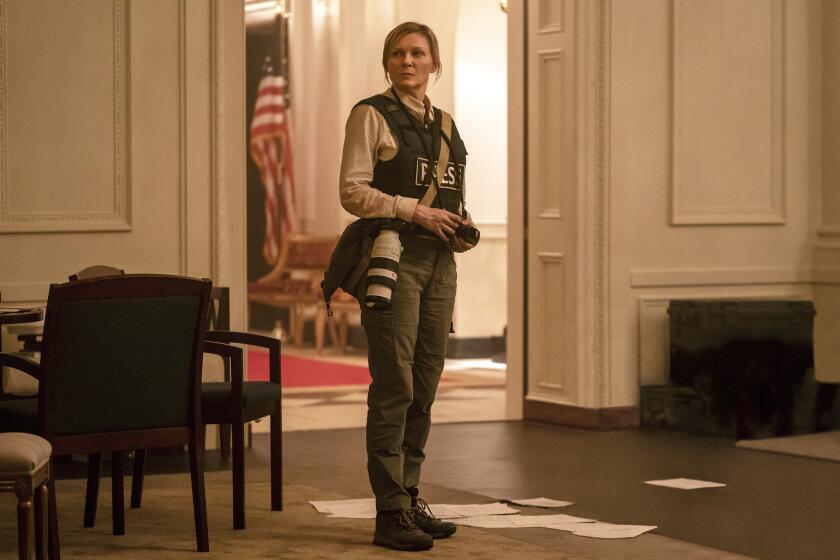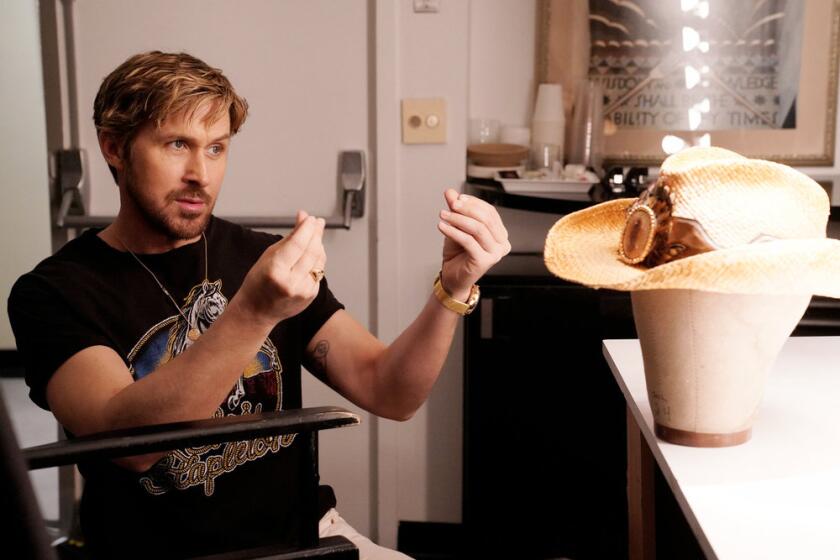Indie Focus: Outsiders abound in ‘The Shape of Water,’ ‘I, Tonya,’ ‘Foxtrot’ and ‘Bombshell’
Hello! I’m Mark Olsen. Welcome to another edition of your regular field guide to a world of Only Good Movies.
As awards season moves along, Times writers Justin Chang and Glenn Whipp sat down to take a reading following the voting of a few critics groups and ahead of Monday’s Golden Globes nominations. Titles like “Lady Bird” and “Call Me By Your Name” have been getting a lot of attention so far, but will that continue moving forward?
As Glenn put it, “I think one of the most vital things a critics group can do is expand the definition of what constitutes an awards-worthy performance.”
Tre’vell Anderson spoke to James Ivory, screenwriter of the current “Call Me By Your Name” but also the Ivory of the famed Merchant-Ivory partnership that created such films as “Maurice,” “A Room With a View” and “Remains of the Day.” Thinking of “Call Me,” directed by Luca Guadagnino, as connected to those films both revitalizes the ideas of those earlier pictures and gives an air or respectability to the new one.
Of the tremendous wave of response to “Call Me By Your Name,” Ivory said, “I think every adult who sees the film or reads the book has gone through the splendors and terrors of first love, what that brings with it, the good and the bad. Everybody can identify with that.”
We have a screening on Tuesday of “The Pirates of Somalia,” followed by a Q&A with director Bryan Buckley. And we should have more coming up soon, so for updates on future events, go to events.latimes.com.
‘The Shape of Water’
Guillermo del Toro’s “The Shape of Water” is a monster movie, a Cold War espionage, a romance and more. It’s a wild, idiosyncratic, vividly emotional mélange of genres that comes together as something truly special. In the film, Sally Hawkins plays a mute woman who works as a cleaner at a top-secret government facility in early 1960s Baltimore. Into her life comes a fish-man creature (Doug Jones), who is being held captive there. The film’s stellar supporting cast includes Michael Shannon, Octavia Spencer, Richard Jenkins and Michael Stuhlbarg.
In his review for The Times, Kenneth Turan gave a spotlight to actor and Del Toro regular Jones, who portrays the “half-amphibian, half-matinee-idol” creature. As Turan noted, “Even for Jones, ‘Shape of Water’ offers an unprecedented deep dive into a singular creature and a spectacular costume.”
For the New York Times, A.O. Scott wrote that Del Toro “fuses a fan’s ardor with a romantic sensibility that is startling in its sincerity. He draws on old movies, comic books, mythic archetypes and his own restless visual imagination to create movies that seem less made than discovered, as if he had plucked them from the cultural ether and given them color, voice and form.”
At Time, Stephanie Zacharek added, “With ‘The Shape of Water,’ Del Toro has conceived an adult fairytale with overt erotic elements. He doesn’t shy away from imagining Elisa’s desire, as well as her love of beauty and her disappointment in all that the real world has to offer her.”
(And yes we linked to this before, but I visited the set of the movie during production and interviewed Jones while in his fish-man costume.)

‘I, Tonya’
The saga of Tonya Harding is well-known, yet the movie “I, Tonya” presents her story in a way that feels completely new and fresh, transforming her from tabloid villain into something more complicated. Directed by Craig Gillespie, the film features a powerful lead performance by Margot Robbie as the notorious figure skater with Allison Janney as her mother and Sebastian Stan as Harding’s husband, Jeff Gillooly.
I spoke to Robbie, Janney and Stan along with Gillespie and screenwriter Steven Rogers about the complex portrait of Harding that emerges from the film. She’s not exactly heroic, but definitely far more human.
“You can’t sum her up in a sentence,” Robbie added. “You can’t sum up a person in a sentence of a neat soundbite headline. You can’t, there’s just so much more to it.”
In his review for The Times, Justin Chang grappled with the tricky elements of the movie’s tone, when he wrote, “Robbie’s performance, especially in its wrenching final moments, lights up the movie like a beacon, and her sympathetic reclamation of Harding’s image feels fully earned. But the irony of this story — especially with a title like ‘I, Tonya’ — is that Tonya herself, easy as she is to root for, feels almost upstaged by all the secondhand goombah shenanigans on display.”
For the New York Times, Manohla Dargis takes an even tougher stance on the movie, writing, “As ‘I, Tonya’ skips here and there and thickens the plot, it becomes increasingly baffling why the filmmakers decided to put a comic spin on this pathetic, dispiriting story. No matter how hard the movie tries to coax out laughs, there’s little about Ms. Harding, her circumstances or her choices that skews as funny. … In many ways Ms. Harding had already been found guilty for just being who she was. The same feels true here.”
With a more positive take on its strategies, at the Village Voice, April Wolfe said that the film “spins the tragedy of Tonya Harding and Nancy Kerrigan into a searing indictment of America’s obsession with ‘America’ and the ways that public opinion can be irreparably warped by sensationalist news media. Those expecting camp or catfights won’t find them in Gillespie’s movie, which instead offers thoughtful and somewhat objective critiques, plus much seriously dark humor that’ll elicit a lot of uncomfortable gasps of laughter — and invites you to ponder difficult truths.”
‘Foxtrot’
At the opening, ‘Foxtrot,’ the new film from Israeli filmmaker Samuel Maoz, who gained attention with his last film, 2009’s “Lebanon,” a couple are informed their son has been killed during his military service. The story seems straightforward enough but soon veers into something very different from how it first appears.
In his review for The Times, Kenneth Turan wrote, “No matter what you’re expecting, ‘Foxtrot’ is not the film you expect it to be. It’s better.” He also noted, “One of the things this film is concerned about, though it in no way forces the issue, is the state of mind of the state of Israel. It shows how agonizing the loss of a single life can be and the toll constant war can take on a nation’s psyche. There are no answers here, there couldn’t be, but ‘Foxtrot’ understands the importance of asking the questions.”
Steve Zeitchik — our much-missed former colleague here at The Times who recently moved on to the Washington Post — wrote about the film when it both swept Israel’s Ophir awards with eight prizes and stirred no small amount of controversy at home. “I won’t be naive and say there is no social or political statement in my film,” Maoz said. “But it’s more broad than specific. I don’t have an interest in a realistic film about a roadblock. The roadblock is a microcosm of a society — any society — that has its perception distorted by a past trauma.”
‘Bombshell: The Hedy Lamarr Story’
The new documentary “Bombshell: The Hedy Lamarr Story,” directed by Alexandra Dean tells the story of the actress and inventor Hedy Lamarr, who faced down scandal to do things her way. It is likely not incorrect to say that Lamarr was too smart for Hollywood, and it is no coincidence that there has been a recent rise in interest in her story.
As Kenneth Turan put it in his review for The Times, “Like someone who was a business tycoon by day and a crime fighter by night, Lamarr may have made a living as one of the world’s most beautiful actresses, but her passion was invention.”
Writing for Tablet Magazine, J. Hoberman noted that thanks to recordings of her voice by journalist Fleming Meeks used in the film, “Lamarr’s flirtatious humor, her rueful silvery laugh, and lilting accent are as Viennese as a slice of sachertorte mit sahne — and her nostalgia for the vanished pre-war Vienna of her youth is palpable. Thanks in large measure to Meeks’ recordings, Bombshell is the best vehicle Lamarr ever had.”
There is also, no surprise, an episode dedicated to Lamarr on Karina Longworth’s essential film history podcast “You Must Remember This.”
Email me if you have questions, comments or suggestions, and follow me on Twitter @IndieFocus
SIGN UP for the free Indie Focus movies newsletter »
More to Read
Only good movies
Get the Indie Focus newsletter, Mark Olsen's weekly guide to the world of cinema.
You may occasionally receive promotional content from the Los Angeles Times.







